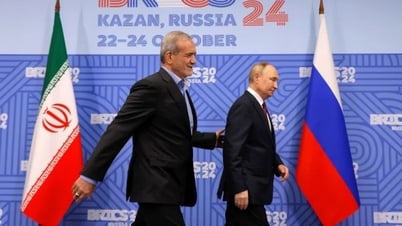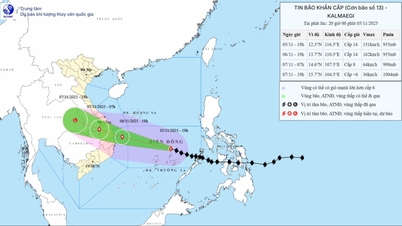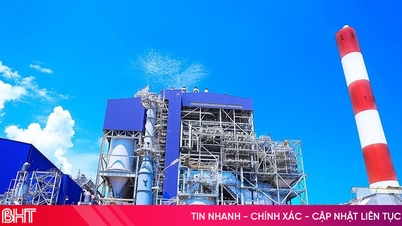Not long ago, a shipment of liquefied natural gas (LNG) quietly arrived at a Chinese port. Notably, this shipment came from Arctic LNG 2 - a Russian energy project that is on the US sanctions list.
At the same time, at an economic forum in Vladivostok, Russia made a strong statement that the Power of Siberia 2 gas pipeline project will soon become a reality, bringing benefits to both sides.
These two seemingly unrelated events paint a larger picture of a profound shift in global energy flows. More than just a business deal, this is a strategic move that ushers in a new era of gas markets, where China is increasingly becoming a major player, reshaping the competition and potentially challenging the position of traditional energy powers like the United States.
The energy axis shifts to the East.
For a long time, the US has used its energy export capacity as a negotiating tool, a “soft power” on the international stage. However, Beijing, which is the world’s largest LNG importer, is showing a clear shift in its energy policy.
China recently halted LNG imports from the US, a move analysts said was related to trade tensions. Beijing has instead turned to Russia for supplies.
The Power of Siberia 2 project, if realized, would be the clearest evidence of this change. The pipeline is designed to connect Siberian gas fields, which previously served the European market, to the Chinese market, passing through Mongolia.
With an expected capacity of up to 50 billion cubic meters per year, equivalent to nearly half of China's total LNG imports, the project is not only a supply supplement but also a strategic lever.
Along with Power of Siberia 2, Russia's Gazprom and China's CNPC are also said to have agreed to increase the capacity of existing pipelines, including Power of Siberia 1. If all these agreements come into effect, the amount of pipeline gas that Russia exports to China will double.
Russia announced a historic agreement, pledging to supply more than 100 billion cubic meters of gas to China - a turning point that could reshape the global energy map (Photo: AI).
Economic benefits intertwine with risks
For Russia, the deal offers a strategic escape. Having been cut off from the European market by the conflict with Ukraine, Moscow needs a large, stable customer to replace it.
While it may have to accept a discount to the European market, having a long-term buyer would help Russia maintain energy flows and mitigate the impact of sanctions. It would also strengthen the economic and political ties between the two countries, creating a new energy alliance.
For China, diversifying its energy supply is a top priority. With the Power of Siberia 2 pipeline, Beijing will have a reliable gas supply that is not affected by geopolitical risks at sea or issues related to international trade.
Piped gas also tends to have more stable prices than LNG, giving China better control over its energy costs. Moreover, with this new negotiating leverage, China can bargain for better prices in future LNG contracts.
The deal is not without risks, however, with many analysts skeptical that the Power of Siberia 2 project will actually be implemented.
"There is still a lot of uncertainty about whether the project will go ahead, especially since China and Russia still have to agree on price, production and financing," said Anne-Sophie Corbeau, a global studies scholar at Columbia University.
The price issue, which has been a sticking point for years, has not been made public. Whether Russia would accept lower profits in exchange for a stable market instead of Europe is a big question. Moreover, the Chinese side has been quite secretive.
This shift will create a domino effect in the global energy market. Once Russia diverts gas from Europe to Asia and China increases gas imports via pipeline, demand for LNG will decrease.
There is no scenario in which China can simultaneously double its pipeline gas imports, keep domestic production strong, and continue to increase LNG imports, according to Florence Schmit, energy strategist at Rabobank.
This poses a dilemma for US LNG exporters. With many export projects under construction, a drop in Chinese imports would be a major shock.
US energy companies could face overcapacity, undermining future projects and potentially forcing them to accept lower prices. “These deals will be a major blow to the global LNG industry and the world’s largest LNG suppliers,” Schmit said.
The Power of Siberia 2 agreement sends a strong signal that the world is witnessing the rise of a new energy axis that will not only reshape commodity flows but also challenge economic power structures that have existed for decades.
Source: https://dantri.com.vn/kinh-doanh/khi-dot-nga-do-ve-trung-quoc-va-thoa-thuan-lich-su-20250905181942987.htm





![[Photo] Opening of the 14th Conference of the 13th Party Central Committee](https://vphoto.vietnam.vn/thumb/1200x675/vietnam/resource/IMAGE/2025/11/05/1762310995216_a5-bnd-5742-5255-jpg.webp)































![[Photo] Panorama of the Patriotic Emulation Congress of Nhan Dan Newspaper for the period 2025-2030](https://vphoto.vietnam.vn/thumb/1200x675/vietnam/resource/IMAGE/2025/11/04/1762252775462_ndo_br_dhthiduayeuncbaond-6125-jpg.webp)
























































![[Motion Graphics] 5 notes when converting from lump-sum tax to declaration](https://vphoto.vietnam.vn/thumb/402x226/vietnam/resource/IMAGE/2025/11/06/1762381214740_fb_thoi-tiet-cms-1200x800-3.jpeg)


















Comment (0)